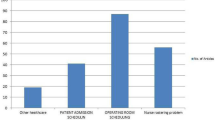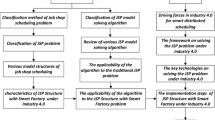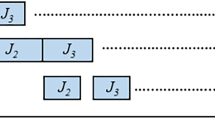Abstract
The single-machine scheduling problem with truncated sum-of-processing-times-based learning effect and past-sequence-dependent job delivery times is considered. Each job’s delivery time depends on its waiting time of processing. For some regular objective functions, it is proved that the problems can be solved by the smallest processing time first rule. For some special cases of the total weighted completion time and the maximum lateness objective functions, the thesis shows that the problems can be solved in polynomial time.
Similar content being viewed by others
References
Badiru AB (1992) Computational survey of univariate and multivariate learning curve models. IEEE Trans Eng Manag 39:176–188
Biskup D (2008) A state-of-the-art review on scheduling with learning effects. Eur J Oper Res 188:315–329
Cheng TCE, Wu C-C, Lee W-C (2010) Scheduling problems with deteriorating jobs and learning effects including proportional setup times. Comput Ind Eng 58:326–331
Cheng TCE, Cheng S-R, Wu W-H, Hsu P-H, Wu C-C (2011) A two-agent single-machine scheduling problem with truncated sum-of-processing-times-based learning considerations. Comput Ind Eng 60:534–541
Cheng TCE, Kuo W-H, Yang D-L (2013) Scheduling with a position-weighted learning effect based on sum-of-logarithm-processing-times and job position. Inf Sci 221:490–500
Cheng TCE, Kuo W-H, Yang D-L (2014) Scheduling with a position-weighted learning effect. Optim Lett 8:293–306
Geyik F, Dosdoǧru AT (2013) Process plan and part routing optimization in a dynamic flexible job shop scheduling environment: an optimization via simulation approach. Neural Comput Appl 23:1631–1641
Graham RL, Lawler EL, Lenstra JK, Rinnooy Kan AHG (1979) Optimization and approximation in deterministic sequencing and scheduling: a survey. Ann Discret Math 5:287–326
Koulamas C, Kyparisis GJ (2010) Single-machine scheduling problems with past-sequence-dependent delivery times. Int J Prod Econ 126:264–266
Li G, Luo M-L, Zhang W-J, Wang X-Y (2015) Single-machine due-window assignment scheduling based on common flow allowance, learning effect and resource allocation. Int J Prod Res 53(4):1228–1241
Li L, Yang S-W, Wu Y-B, Huo Y, Ji P (2013) Single machine scheduling jobs with a truncated sum-of-processing-times-based learning effect. Int J Adv Manuf Technol 67:261–267
Liu M (2013) Parallel-machine scheduling with past-sequence-dependent delivery times and learning effect. Appl Math Model 37:9630–9633
Liu M, Wang S, Chu C (2013) Scheduling deteriorating jobs with past-sequence-dependent delivery times. Int J Prod Econ 144:418–421
Liu M, Zheng FF, Chu CB, Yf Xu (2012) Single-machine scheduling with past-sequence-dependent delivery times and release times. Inf Process Lett 112:835–838
Liu M, Zheng FF, Chu CB, Yf Xu (2012) New results on single-machine scheduling with past-sequence-dependent delivery times. Theor Comput Sci 438:55–61
Lu Y-Y, Li G, Wu Y-B, Ji P (2014) Optimal due-date assignment problem with learning effect and resource-dependent processing times. Optim Lett 8:113–127
Niu Y-P, Wan L, Wang J-B (2015) A note on scheduling jobs with extended sum-of-processing-times-based and position-based learning effect. Asia Pac J Oper Res 32(2):1550001 (12 pages)
Rudek R (2012) The single processor total weighted completion time scheduling problem with the sum-of-processing-time based learning model. Inf Sci 199:216–229
Rudek R (2013) On single processor scheduling problems with learning dependent on the number of processed jobs. Appl Math Model 37:1523–1536
Shen L, Wu Y-B (2013) Single machine past-sequence-dependent delivery times scheduling with general position-dependent and time-dependent learning effects. Appl Math Model 37:5444–5451
Sun L-H, Cui K, Chen J-H, Wang J, He X-C (2013) Some results of the worst-case analysis for flow shop scheduling with a learning effect. Ann Oper Res 211:481–490
Sun L-H, Cui K, Chen J-H, Wang J, He X-C (2013) Research on permutation flow shop scheduling problems with general position-dependent learning effects. Ann Oper Res 211:473–480
Wang J-B, Ji P, Cheng TCE, Wang D (2012) Minimizing makespan in a two-machine flow shop with effects of deterioration and learning. Optim Lett 6:1393–1409
Wang X-R, Jin J, Wang J-B, Ji P (2014) Single machine scheduling with truncated job-dependent learning effect. Optim Lett 8:669–677
Wang J-B, Wang M-Z (2011) Worst-case behavior of simple sequencing rules in flow shop scheduling with general position-dependent learning effects. Ann Oper Res 191:155–169
Wang J-B, Wang M-Z (2012) Worst-case analysis for flow shop scheduling problems with an exponential learning effect. J Oper Res Soc 63:130–137
Wang J-B, Wang M-Z (2014) Single-machine due-window assignment and scheduling with learning effect and resource-dependent processing times. Asia Pac J Oper Res 31(5):1450036 (15 pages)
Wang J-B, Wang J-J (2014) Single machine scheduling with sum-of-logarithm-processing-times based and position based learning effects. Optim Lett 8:971–982
Wang J-B, Wang J-J (2014) Flowshop scheduling with a general exponential learning effect. Comput Oper Res 43:292–308
Wang X-Y, Wang J-J (2014) Scheduling deteriorating jobs with a learning effect on unrelated parallel-machines. Appl Math Model 38:5231–5238
Wang J-B, Wang M-Z, Ji P (2012) Single machine total completion time minimization scheduling with a time-dependent learning effect and deteriorating jobs. Int J Syst Sci 43:861–868
Wang J-B, Wang X-Y, Sun L-H, Sun L-Y (2013) Scheduling jobs with truncated exponential learning functions. Optim Lett 7:1857–1873
Wang X-Y, Zhou Z, Zhang X, Ji P, Wang J-B (2013) Several flow shop scheduling problems with truncated position-based learning effect. Comput Oper Res 40:2906–2929
Weckman G, Bondal AA, Rinder MM, Young WA II (2012) Applying a hybrid artificial immune systems to the job shop scheduling problem. Neural Comput Appl 21:1465–1475
Wu C-C, Yin Y, Wu W-H, Cheng S-R (2012) Some polynomial solvable single-machine scheduling problems with a truncation sum-of-processing-times based learning effect. Eur J Ind Eng 6:441–453
Wu C-C, Yin Y, Cheng S-R (2013) Single-machine and two-machine flowshop scheduling problems with truncated position-based learning functions. J Oper Res Soc 64:147–156
Yang D-L, Cheng TCE, Kuo W-H (2013) Scheduling with a general learning effect. Int J Adv Manuf Technol 67:217–229
Yang S-J, Hsu C-J, Chang T-R, Yang D-L (2011) Single-machine scheduling with past-sequence-dependent delivery times and learning effect. J Chin Inst Ind Eng 28:247–255
Yang S-J, Yang D-L (2012) Single-machine scheduling problems with past-sequence-dependent delivery times and position-dependent processing times. J Oper Res Soc 63:1508–1515
Yang S-J, Guo J-Y, Lee H-T, Yang D-L (2013) Single-machine scheduling problems with past-sequence-dependent delivery times and deterioration and learning effects simultaneously. Int J Innov Comput Inf Control 9:3981–3989
Yin Y, Cheng TCE, Xu J, Cheng S-R, Wu C-C (2013) Single-machine scheduling with past-sequence-dependent delivery times and a linear deterioration. J Ind Manag Optim 9:323–339
Yin Y, Liu M, Cheng TCE, Wu C-C, Cheng S-R (2013) Four single-machine scheduling problems involving due date determination decisions. Inf Sci 251:164–181
Zhao C, Tang H (2014) Single machine scheduling problems with general position-dependent processing times and past-sequence-dependent delivery times. J Appl Math Comput 45:259–274
Zhang X, Yan G, Huang W, Tang G (2012) A note on machine scheduling with sum-of-logarithm-processing-time-based and position-based learning effects. Inf Sci 187:298–304
Acknowledgments
We are grateful to the anonymous referees for their helpful comments on an earlier versions of this note. This research was supported by the Science Research Foundation of Shenyang Aerospace University (Grant No. 201304Y), the National Natural Science Foundation of China (Grant Nos. 71471120, 71271039), New Century Excellent Talents in University (NCET-13-0082), and Changjiang Scholars and Innovative Research Team in University (IRT1214).
Conflict of interest
The authors declare that they have no conflict of interest.
Author information
Authors and Affiliations
Corresponding author
Rights and permissions
About this article
Cite this article
Wu, YB., Wang, JJ. Single-machine scheduling with truncated sum-of-processing-times-based learning effect including proportional delivery times. Neural Comput & Applic 27, 937–943 (2016). https://doi.org/10.1007/s00521-015-1910-3
Received:
Accepted:
Published:
Issue Date:
DOI: https://doi.org/10.1007/s00521-015-1910-3




